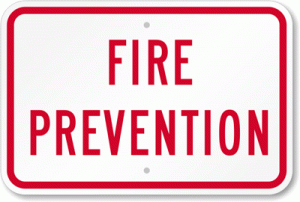Is your home prepared for a fire?
As far fetched as it may seem, your house catching fire is a possibility. According to the Centers For Disease Control and Prevention (CDC) in the United States, “In 2010, fire departments responded to 384,000 home fires in the United States, which claimed the lives of 2,640 people.”
In such a high risk scenario, it is advisable to rope in some foresight and plan. Here are 10 simple tips via which you can ensure that your home is not the victim of a fire.
1. Check electrical fittings – You home’s electrical system needs a constant check; overloading of circuits and extension cords is a common practice that must be avoided, never place cords or wires beneath rugs. Check for old damaged wiring that may have been bitten off by insects, especially in areas like the attic. Take note of breakers which “trip” very often or fuses which “blow”, this might be indicators of a faulty connection or an overloaded circuit.
2. Install home sprinklers – Home sprinklers will help douse the flames of a fire much more quickly and effectively. Sprinklers are not extremely expensive and they detect fire even when no one is at home, making it a potent tool to prevent a fire from escalating.
3. Keep inflammable liquids away from ignition sources – Many are often not aware that even an innocuous looking bottle of perfume if placed next to an ignition source can cause a fire. Hazardous items like batteries, beauty products, medical supplies, paint and varnishes, chemical cleaning agents, are products that are inflammable when in contact with an ignition source. Such items should not be stored in proximity to devices which are equipped with a pilot switch.
4. Check your fireplace – Usually associated with warmth and comfort, your fireplace has the ability to start a fire if not maintained well. Check the fire box for any cracks, install a fire door or a wire mesh to ensure that the embers of the fire don’t spark outward from the fireplace. Get your chimney inspected atleast once a year.
5. Avoid smoking in a lying down position – If you are in the habit of lying down on the couch or bed while enjoying your puff, it’s a bad idea! Lying down while smoking might increase the risk of you falling asleep with a lit cigarette in hand. Dropping the cigarette on the floor while unconscious is an even greater risk, as this might instantly set fire to the carpet. Hence, always make sure to smoke outside the house or in a standing position.
6. Install a smoke alarm and fire extinguisher – A smoke alarm is not very costly and installing it can double chances of surviving a fire. Make sure to replace the alarm’s batteries and test it once a month. A fire extinguisher will be extremely handy to douse out a fire, provided it is used correctly.
7. Use appliances carefully – While using portable heaters, make sure to keep away any sort of bedding, curtains, clothes and combustable items. Electric blankets and warmers should be checked for flimsy wiring to ensure safety. Electric cords should be given breathing space, do not place cords where heat can easily build up, like against walls.
8. Be careful while using candles – Candle fires are not uncommon, keep the flame of a candle at least 12 inches away from any inflammable item, for example wood panels or curtains. Also consider using battery operated flameless candles, these new candles are warmers as well as fragrance providers.
9. Kitchen safety – Do not leave your cooking range on and unattended, turn off all the burners even if you are leaving the kitchen for a minute. This will ensure maximum safety against an accidental fire. Also, while cooking with substances like oil, always keep a lid or a cookie sheet close by, if flames appear, you can immediately douse them by slapping a lid on them.
10. Plan a fire escape route – Last, but most important, be prepared to flee. Plan an escape route from each room of the house, children should in particular be taught what to do incase of a fire. Have a mock fire drill every once in a while to make sure that each member of the house is aware of what to do in an emergency.












